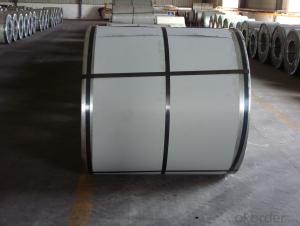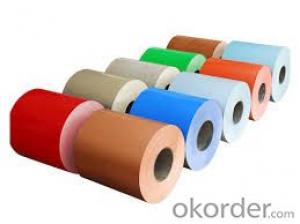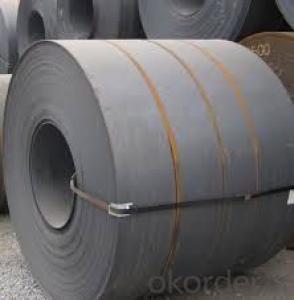GALVANIZED STEEL IN COIL
- Loading Port:
- China Main Port
- Payment Terms:
- TT OR LC
- Min Order Qty:
- -
- Supply Capability:
- -
OKorder Service Pledge
OKorder Financial Service
You Might Also Like
Product Description:
Commodity | Hot dip galvanized steel coil and sheet |
Technical Standard: | JIS 3302 / ASTM A653 / EN10143 |
Grade | DX51D / DX52D/ DX53D/ S250,280,320GD |
Types: | Commercial / Drawing / Deep Drawing / Structural quality |
Width | 500/650/726/820/914/1000/1200/1219/1220/1250mm |
Thickness | 0.12-2.8mm |
Type of coating: | Galvanized |
Zinc coating | Z30-275g/m2 |
Surface Treatment | Chromed / Skin-pass/ Oiled/Slightly Oiled/ Dry/ Anti-fingerprint |
Surface structure: | Zero spangle / minimized spangle / regular spangle/ big spangle |
ID coil | 508mm or 610mm |
Coil weight | 3-8 MT per coil |
Package: | Properly packed for ocean freight exportation in 20''containers |
Application: | Industrial panels, roofing and siding for painting |
Price terms | FOB,CFR,CIF |
Payment terms | T/T or L/C |
Delivery time | Within 30 days |
Remarks | Insurance is all risks |
MTC will be handed on with shipping documents | |
We accept the third party certification test,such as SGS/BV |
Technical data :
Hot dipped galvanized coil Technical Data
Chemical Composition | ||||||
GRADE | C | Si | Mn | P | S | Ti |
SGCC/DX51D+Z | ≤0.10 | ≤0.50 | ≤0.60 | ≤0.10 | ≤0.030 | ≤0.020 |
DX52D+Z | ≤0.10 | ≤0.50 | ≤0.60 | ≤0.10 | ≤0.030 | ≤0.020 |
SGCD/DX53D+Z | ≤0.10 | ≤0.30 | ≤0.50 | ≤0.05 | ≤0.030 | ≤0.020 |
SGCE/DX54D+Z | ≤0.10 | ≤0.30 | ≤0.30 | ≤0.03 | ≤0.020 | ≤0.020 |
DX56D+Z | ≤0.10 | ≤0.30 | ≤0.30 | ≤0.03 | ≤0.020 | ≤0.020 |
Structural | ≤0.20 | ≤0.60 | ≤1.70 | ≤0.10 | ≤0.045 | |
|
|
|
|
|
| |
Hot dipped galvanized steel coil Mechanical Properties | |||
GRADE | Yield Strength MPa | Tensile Strength MPa | Elongation % |
SGCC(DX51D+Z) | ≥205 | ≥270 | - |
SGCD(DX53D+Z) | - | ≥270 | 38 |
SGCE(DX54D+Z) | - | ≥270 | 40 |
DX56D+Z | - | ≥270 | 42 |
- Q:How are steel coils inspected for flatness?
- Steel coils are inspected for flatness using various methods, such as visual inspection, measuring the crown or center buckle, and conducting a straight edge test. These techniques help assess any deviations or unevenness in the coil's surface, ensuring that it meets the required flatness standards.
- Q:Steel roofing info. Pros and cons on steel roofing?
- Steel roofing Pro...life of product is much longer then Asphalt shingles....Looks great...multi colors.......Just love the stuff... Cons....More costly then singles at first but since it last longer it is really a better buy.......
- Q:How is steel different than iron?How many different kinds of steel are there?What type is the strongest?Which type is the weakest?
- As first answer says, if you look at the number of commercial steel alloys available and consider that any given alloy can be heat treated to a wide range of physical properties, there are thousands and thousands of potential combinations. Technically, steel is an alloy of Fe and C but there are Fe-C alloys that are called cast irons, not steel, and... there are lots of alloy steels which have significant amounts of other elements added like Cr, Ni, Nb, V, Mo, etc. Fe alloys that have a lot of Cr and or Ni added are called stainless steels and there are dozens of them and many of them can be heat treated to produce a wide range of properties. As far as the strongest or the weakest, you have to get really specific about exactly what you mean because some steels are designed for room temperature properties, some are designed for elevated temperature properties, some for static loads, some for impact loads, some for wear resistance, etc, etc.. Steels make up the largest family of metal alloys (by weight and by volume) that humans use. There are a number of reasons for this but the big reasons include: 1) there is a LOT of iron on earth 2) it is relatively cheap to produce 3) you can easily change the physical properties over a every wide range. As an example... you can take a piece of steel that is so brittle it will shatter if you drop it on the floor and heat treat it so you can bend it like a pretzel without cracking and then heat treat it again to make it very strong and tough (resistant to fracture).
- Q:What are the dimensions of steel coils used in automotive part manufacturing?
- The dimensions of steel coils utilized in the manufacturing of automotive parts may differ based on the particular application and manufacturer involved. Nonetheless, typical dimensions for steel coils in automotive part production lie within the range of 0.5 to 3 millimeters in thickness and 600 to 2000 millimeters in width. Additionally, the length of the coils can vary considerably, generally spanning from a few meters to several hundred meters. It is crucial to acknowledge that these dimensions are not set in stone and can be tailored to satisfy the specific demands of each automotive part being produced.
- Q:How do steel coils contribute to structural integrity in buildings?
- The role of steel coils in ensuring the structural integrity of buildings cannot be overstated. They play a vital role in multiple ways. To begin with, steel coils are extensively utilized in the construction industry to manufacture essential building components like beams, columns, and trusses. These components are responsible for providing support and stability to the overall structure. Due to their exceptional tensile strength and durability, steel coils guarantee that these components can withstand heavy loads and maintain their structural integrity over an extended period. This is particularly crucial in buildings with multiple floors or large open spaces, where the structural elements need to bear substantial weight without deforming or collapsing. Moreover, steel coils are also instrumental in reinforcing concrete structures. Reinforced concrete is a widely adopted construction technique, and steel coils, in the form of reinforcement bars or mesh, are embedded within the concrete to counteract tensile forces. While concrete excels at withstanding compressive forces, it is weak in tension. By incorporating steel coils, the composite material gains the ability to resist both compression and tension, thereby enhancing its structural integrity. This reinforcement technique is particularly vital in high-rise buildings or structures subject to seismic activity, where the risk of structural failure due to bending or cracking is heightened. Another significant contribution of steel coils to structural integrity lies in their corrosion resistance properties. Steel coils are often coated with protective layers, such as zinc through galvanization or paint, to prevent corrosion caused by moisture, chemicals, or environmental factors. Corrosion weakens the structural integrity of steel, leading to degradation and potential failure. By utilizing corrosion-resistant steel coils, the lifespan of the building is prolonged, and the risk of structural damage is significantly diminished. Furthermore, steel coils offer tremendous versatility in design and construction. Their flexibility and malleability allow for the creation of complex and intricate building structures, enabling architects and engineers to push the boundaries of design while maintaining structural integrity. Steel coils can be shaped, bent, and welded into various forms, making them an ideal material for constructing innovative and aesthetically pleasing buildings. In conclusion, steel coils are indispensable in ensuring the structural integrity of buildings. Their strength, stability, durability, corrosion resistance, and design versatility make them an essential material in modern construction, guaranteeing the safety and longevity of buildings for years to come.
- Q:How are steel coils used in the manufacturing of HVAC systems?
- Steel coils are used in the manufacturing of HVAC systems as they serve as the main component of heat exchangers, which are responsible for transferring heat between the air and refrigerant. The steel coils provide a sturdy and durable structure for the heat exchanger while also allowing for efficient heat transfer, ensuring optimal performance in heating and cooling processes.
- Q:What's the best way to clean granite countertops and stainless steel appliances? My countertops especially always look dull and streaky. Thanks!!!!!!!
- I just use my Method brand dish soap to clean my stainless fridge. Then polish it with a dry soft cloth. Then it also smells like cucumber when I'm done. :-)
- Q:How are steel coils used in the production of electrical enclosures?
- Steel coils are used in the production of electrical enclosures to provide structural strength and durability. The coils are typically cut and bent into specific shapes to form the body and panels of the enclosure. This helps to protect the electrical components inside from external elements and ensure safe operation.
- Q:How are steel coils used in the production of electrical wiring?
- Steel coils are used in the production of electrical wiring as a core material for the conductors. The steel coils are typically shaped into a cylindrical form and coated with an insulating material. This helps in providing structural support to the wiring and also enhances its conductivity and durability.
- Q:How are steel coils used in the production of oil and gas machinery?
- Steel coils are used in the production of oil and gas machinery as they provide essential structural support and reinforcement. These coils are typically formed into various components such as pipes, tubes, and casings, which are crucial for drilling, extraction, and transportation processes in the oil and gas industry. The strength and durability of steel coils ensure the reliability and longevity of the machinery, allowing for efficient and safe operations in the oil and gas sector.
1. Manufacturer Overview |
|
|---|---|
| Location | |
| Year Established | |
| Annual Output Value | |
| Main Markets | |
| Company Certifications | |
2. Manufacturer Certificates |
|
|---|---|
| a) Certification Name | |
| Range | |
| Reference | |
| Validity Period | |
3. Manufacturer Capability |
|
|---|---|
| a)Trade Capacity | |
| Nearest Port | |
| Export Percentage | |
| No.of Employees in Trade Department | |
| Language Spoken: | |
| b)Factory Information | |
| Factory Size: | |
| No. of Production Lines | |
| Contract Manufacturing | |
| Product Price Range | |
Send your message to us
GALVANIZED STEEL IN COIL
- Loading Port:
- China Main Port
- Payment Terms:
- TT OR LC
- Min Order Qty:
- -
- Supply Capability:
- -
OKorder Service Pledge
OKorder Financial Service
Similar products
New products
Hot products
Hot Searches
Related keywords





























